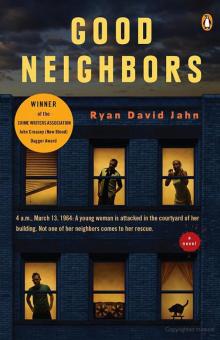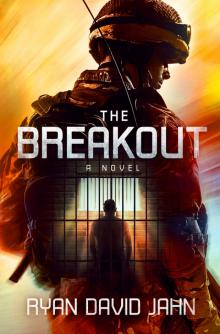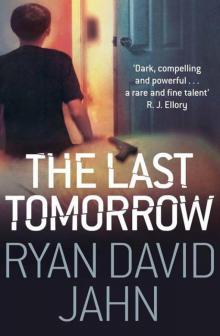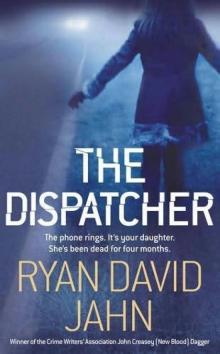- Home
- Ryan David Jahn
Good Neighbors Page 4
Good Neighbors Read online
Page 4
He walks to his easy chair and sits back down. He leans forward so that he can use the coffee table as a writing surface, and then he stops. Taps the pencil on the table’s surface, thinking about what he should say. He wonders who first called it a pencil.
To whom it may concern, he writes, thinking the formality of the opening is probably the wrong way to go, but he continues anyway with, if it may, in fact, concern anyone, about which I have my doubts: Nothing tragic happened in my life. You will find no reason for this. You will only find a lack of reason. There was simply no reason to keep waking up. Why get in your car if you’ve got nowhere to go?
He signs the note.
He reads it twice, nods to himself, and sets the pencil down.
He picks up the gun and puts it to his temple for the third time.
He wonders why there aren’t any good suicide jokes. Suicide is kind of funny when you think about it, kind of ridiculous.
He sits there with the barrel pressed against his head for almost two minutes before taking it away again, setting it down on the coffee table, and getting to his feet.
Thomas has two suits, an okay suit and a good suit. The okay suit is light gray and would be good for a job interview ; the good suit is black, made of high-quality fabric, and would be good for funerals and other formal affairs. Thomas wears the okay one. He wants to look decent when they find him, even if he is bloated and the blood has settled to his lower half and begun seeping through the pores like sweat, but he doesn’t want to ruin his good suit. They’ll need that to bury him in.
He stands in front of his dresser mirror, adjusts his tie, then picks up a comb from the dresser, licks it, and tries to comb down the gray wisps of his hair. They go down momentarily but pop up again.
‘Goddamn it,’ he says.
He licks his fingertips and tries to force his hair down, but the wisps just pop up yet again.
He can feel his stomach knotting as it does whenever he finds he’s lost control of a situation.
Once, about fifteen years ago, he had a string of meat stuck between two teeth, molars way in the back, left side, and he tried and tried to tongue it out and failed, and his stomach started knotting up. So he moved on to a fingernail and tried to dig it out with that, but that failed too. He was having dinner with a woman from work, sitting across from her at a restaurant, so he simply tried to forget it. But he couldn’t. And every time his mind drifted to it, every time his tongue accidentally found it, way back there, lodged between the two last molars on the lower-left side of his mouth, his stomach tightened further, he got more sick, he could taste more bile at the back of his throat.
Finally he had to excuse himself. He had to go to the bathroom and really work to get that string of meat out, cursing himself for ordering roast beef, but for some reason it just wouldn’t come. He couldn’t get his hand into his mouth at the right angle, it was too far back, but he really tried to get his finger back there, to scrape that piece of meat out from between his teeth, and the combination of the nausea from having lost control, from not being able to just get it out, and the reflux from having his hand jammed down his throat, trying to get that string of meat, well, he threw up into the sink.
Fortunately, no one else was in the bathroom at the time and he managed to clean the sink up and rinse his mouth without anyone walking in on him. But he ended up cutting dinner short so that he could drive home and floss that thing out of his mouth, and his stomach was knotted up and sick until he finally did.
‘It’ll be splattered on a wall in five minutes anyway,’ he says to himself now, looking at his hair sticking up in the mirror. And, even though his stomach is tight, he nods to himself.
‘You’re right, of course.’
But then another thought occurs to him.
He sets down the comb and looks for a pair of scissors.
Thomas is back in his easy chair, wearing his okay suit, his hair trimmed. His eyes are closed. The pistol is in his right hand, pressed against his temple. He lets out a heavy breath and just as he approaches that perfect moment, that stillness between breaths during which the whole world pauses, there is a knock at the door.
He opens his wet, red eyes. He swallows.
He feels disoriented, somehow.
Why is he still alive?
He sets the pistol down on the arm of the easy chair.
He shouldn’t have procrastinated so long. Now someone is here. Now he has to get rid of whoever’s on the other side of the door before he can go on with it. It’s always something, though, isn’t it?
‘Who’s there?’
‘How many people did you call?’
‘Three or four,’ Thomas says, remembering now the series of phone calls he made over an hour ago, ‘but you’re the only one who picked up.’
‘To be fair,’ the voice says, ‘you called at a ridiculous hour.’
‘I knew you’d be awake.’
He walks to the front door, unlocks the dead-bolt, the doorknob, the chain, and then pulls it open.
There stands Christopher, wearing a pair of jeans with folded cuffs, his black bowling shoes, and a bowling shirt that matches Thomas’s own. And Larry’s. His hair is black with only a dusting of gray at the temples. His eyes are sharp green with flecks of brown. His jaw is square and blue-green with five o’clock shadow. Or whatever time it is.
‘What happened?’ Christopher steps into the apartment without waiting to be invited and looks around the place. ‘Is your wife here?’
Thomas shakes his head.
‘No,’ he says. ‘She’s out of town, visiting her sister in California.’
California has always been Thomas’s dream place, his agnostic mind’s version of Heaven, which is part of the reason he’s never gone; he never wanted the dream ruined by the reality and he’s always known it would be.
When he was ten, in 1929, when his mom left for good, left him with his grandma (who was lonely since the Great War had made her a widow), she told him she was going out to Hollywood to be a movie star. Over the next couple years, Thomas had dreams of going out to California himself, taking a bus out there. He’d pack a suitcase, take twenty dollars from grandma’s emergency tin, and just go. His mom would be easy to find because her name would be in lights and he would move in with her in her mansion that had plush white carpet that felt like seven-o’clock-in-the-morning grass beneath your feet, cool and perfect, and he would never smell the stink of his grandma again, never have to hear her scary laugh followed by her hacking cough as she listened to her radio shows, never have to watch her spit a wad of phlegm into a handkerchief and then fold the handkerchief on top of it as if she were storing it for later.
‘Go on and play,’ she always said, a lipstick-stained cigarette between two of her clawed, liver-spotted fingers, ‘grandma’s listening to her shows.’
‘What about your daughter?’ Christopher says.
‘She went to California, too.’
‘In the middle of the school year?’
‘Spring break,’ Thomas says.
‘I thought spring break was next month.’
Thomas shrugs. ‘Unofficial spring break.’
He pushes the front door closed and slams the dead-bolt home.
Christopher walks to the gun on the arm of the chair and picks it up, flipping it over in his hands.
‘What’s this?’
‘PEZ dispenser.’
‘It’s loaded.’
‘I like PEZ.’
Christopher sets down the pistol and picks up the envelope on which Thomas wrote his suicide note. He reads it.
‘Jesus, Thomas,’ he says. ‘No reason to keep waking up? You have a wife and daughter. I think that’s two reasons. There are people who really do have nothing, but they still keep finding reasons to get out of bed every morning.’
Thomas scratches his cheek and feels beard stubble.
‘I should have shaved.’
‘What?’
He shakes his head.
‘Nothing.’ Then: ‘I don’t think there’s anything admirable in staying alive just because. If you’ve no reason to wake up in the morning . . . I mean, no reason besides work . . . what’s the point?’
‘You do have a reason. You have two reasons. You have a wife and you have a daughter.’
‘But what if I didn’t?’
‘You do,’ Christopher says. ‘But if you didn’t, then you’d make your own reasons. What you don’t do is throw your hands in the air and just give up. You don’t just quit.’
‘Why not? What’s so special about life?’
Christopher looks at him for a long moment in silence, and then says, ‘It’s all we’ve got.’
Downstairs, someone changes records and turns the music up further.
Thomas stomps the floor furiously.
‘Would you turn that shit down!?’ He looks at Christopher. ‘I’m ready to fucking kill somebody.’
‘You want me to go talk to them?’
Thomas shakes his head, exhaling heavily, calming down – forcing himself to calm down.
‘No. They’re young and full of life.’ He sighs. ‘Time’ll take care of them.’
‘Time’ll take care of us all.’
Thomas nods at that.
‘So why are you trying to hurry things?’
Thomas opens his mouth to speak but nothing comes out.
7
‘You’re so bad,’ Bettie Paulson tells him, giggling, as he takes his hand away from the record player’s volume knob.
And he’s never felt so bad in his life – so downright naughty.
If someone had told Peter Adams even a week ago that he would soon be in a room – his own bedroom – with the naked wife of a friend from work while his own wife was in the very next room, well, he never would have believed it.
Peter is thirty-three and clean cut. He has his hair trimmed weekly whether it needs it or not. He has a bit of a beer belly, which is currently flopped out over his white briefs, the only thing he’s wearing, but despite the gut and the fact that he’s not in his twenties anymore, it’s obvious he tries to take care of himself. It’s impossible to imagine dirt under his fingernails or a hammer in his hand; he’s a man who calls the plumber to plunge the toilet.
Peter laces his fingers behind his head and swings his hips around.
‘You love it,’ he says.
‘I do,’ Bettie says.
Peter grabs his whiskey-and-water from the dresser where he set it when he decided to change records. The glass has left behind a condensation ring. Seeing that ring, Peter curses himself for not using a coaster. He considers leaving, going to get furniture polish and a rag. He doesn’t want a permanent blemish on the dresser. But then he glances at Bettie, sitting up naked in bed, waiting for him, her teardrop breasts with their large light-pink nipples just asking to be stroked and kissed, and he settles on simply wiping the condensation ring off the dresser with the flat of his palm and then wiping his palm off on his underwear.
He’ll take the furniture wax to it tomorrow.
Peter swigs his whiskey and turns to Bettie, trying to forget about the condensation ring.
‘Now where were we?’ he says.
Bettie smiles naughtily, and a cute little shake shimmies up her spine, and she pushes her chest out just a bit.
‘I think,’ she says, ‘that you were kissing my breasts.’ Peter saunters toward her, smiling.
‘Was I?’
Bettie nods.
‘Are you sure?’
She nods again.
‘Both of them?’
‘Mostly the left one, I think,’ Bettie says. ‘Men always like the left one better for some reason.’
‘Well,’ Peter says, ‘it is a little bigger than the right one.’
‘You noticed.’
Peter nods. ‘I’m very observant.’
‘I guess you are.’
‘I can kiss the right one if it’s feeling neglected.’
‘I think it is,’ she says. ‘I think you should.’
Peter crawls across the bed, and circles his tongue around the aureola.
‘Like this?’ he asks.
Bettie leans back and pulls Peter on top of her.
‘Like this,’ she says.
His drink sloshes in his hand, and he reaches out blindly, trying to set it on the nightstand. He and Anne bought marble slabs for the nightstands a few years ago so they wouldn’t need to use coasters on them. It was a smart decision because when one is tired, waking in the middle of the night for a sip of water, one does not always remember to use a coaster. A stone surface eliminates that problem. Peter lets go of the drink, but it misses the nightstand by half, just hits the edge with the clack of glass against stone, and drops to the floor. It hits the floor at an angle, and the impact acts like the hammer of a revolver, shooting the brown liquid and ice out onto the white carpet.
‘Damn it,’ Peter says.
Another stain to clean up. This one he should take care of now. If he lets it soak into the carpet, it’ll never come out. Even if he manages to scrub out the stain tomorrow morning, dirt will always collect there, and every time he walks to bed he’ll see that Rorschach smudge and curse himself. He starts to move off the bed.
But Bettie grabs him by the back of his neck and pulls him down to her moist sex.
‘Don’t worry about the fucking drink,’ she says.
Suddenly it’s a very easy thing to forget.
‘Does your husband do this for you?’ Peter asks, burying his face in her folds, in her scent, her black pubic hair tickling the bridge of his nose.
‘Not like that,’ Bettie says, and pushes her pelvis into his face.
She doesn’t look at him when she says it; she is looking out the window and into the courtyard. Her eyes are glassy and far away but she continues to rhythmically grind herself into his face.
He wonders briefly what she’s thinking, but then decides he doesn’t care.
8
From his living-room window, Frank Riva, a black man closer to fifty than forty, stares out across the courtyard, past his own reflection, past the lamplit courtyard itself, and into a bedroom, where some soft lawyer-type has his face buried in pussy.
Frank wears only a pair of jeans. His torso is bare but for a small patch of black hair on his chest and a barely-visible tattoo above his left pectoral muscle that he unwisely got when he was in the army.
After a moment, he turns away from the window and toward his wife, Erin. She’s about five years younger than him and white. She’s also six inches shorter than him, her sandy blonde hair cut into a cute bob. She is still wearing her nurse’s uniform, which Frank has always found sexy. Even when she hasn’t worked he sometimes asks her to put it on before they make love just so he can take it off again. She is also still wearing her work shoes, which is unusual. She normally has them off before she’s closed the door behind her, but tonight she’s got more important things than her shoes on mind.
They met in 1943, before either of them had turned thirty, though Frank wasn’t far off. He was fresh out of the army and working as a mechanic on Erin’s family’s farm at the time, fixing tractors and other equipment, living in a shed behind the house and sleeping on an itchy green blanket that he laid over stinking wet hay, using an army duffel bag as a pillow, one of his two pairs of pants its stuffing, brushing away the rats that came out from the hay at night and praying he never got bit, saving up the cash he earned, hoping to start his own business, a mechanic shop, with a sign on the front and everything. That’s what he’d been trained as in the army, a mechanic. He spent his two years in the service – January, ’41 to January, ’43 – fixing jeeps at Camp Gordon, Georgia. He never left the country, never met a German, much less shot one. He first saw Erin three months after his arrival on the farm. She was home from college for the summer. He saw her picking figs from a tree near the back of the house, and that’s when she first saw him, too. They both stopped what they were doing and l
ooked at each other. It was a moment and then the moment was over, and Erin’s daddy, Mr. Gregory, was asking Frank a question.
‘When you think that tractor’ll be back up and runnin’?’
‘Should have it going within the hour,’ Frank said.
But Mr. Gregory must have seen something because he looked from Frank to Erin, and then back to Frank again, and even though Erin had gone back to picking figs and wasn’t looking in their direction, Mr. Gregory said, ‘You’re a good guy, Frank. Hard worker. Honest. I like you, Frank—’
‘I like you, too, sir.’
‘—but I’ll be damned if my daughter ends up with a nigger. No offense to you personally, of course. Like I said, I like you. But don’t even think about it. You understand me?’
Frank was holding a wrench in his right hand at the time, and it took all the restraint he had to keep his arm down, to keep from swinging that wrench around toward Mr. Gregory’s left temple, to keep from cracking his skull like an egg, to keep looking relaxed and to keep the anger buried deep down where his boss wouldn’t see it.
‘Frank,’ Mr. Gregory said, ‘are we clear?’
‘Yes, sir,’ Frank said.
Mr. Gregory smiled, patted Frank’s arm a couple times.
‘Good man,’ he said. ‘I’m glad to hear it. If you was white,’ he said, ‘I’d introduce you to her myself. I think that highly of you.’
‘Thank you, sir,’ Frank said through gritted teeth.
Mr. Gregory nodded and walked away, no doubt thinking they’d just had a good talk, man to man, and that they understood each other.
But it was only seven weeks later, six weeks after his first conversation with Erin, that Frank woke up surrounded by flames. Mr. Gregory had found out. Frank didn’t know how. He’d only been talking to her. Quietly, sure. About what kind of future they might have together, sure. But only talking. The first time was a week after Mr. Gregory warned him to stay away from his daughter, but after that, they’d found time together almost every day. Someone either told or Frank and Erin just weren’t as careful about not being seen together by Mr. and Mrs. Gregory as they thought they were; either way, Mr. Gregory poured gasoline all over his own barn and struck a match. The wood was dry and burned quickly and by the time Frank woke he was surrounded by orange and white flames and the popping sounds of exploding lumber, and parts of the roof were falling down around him, and he was coughing, hacking, couldn’t breathe, and his eyes were burning and watering, and he had no idea which way was out, but he stood, stood up blindly on his bare feet, and stumbled, feeling with his arms, going this way, too hot, fire, there’s fire there, and then that way, following the sound of squealing rats as they made their escape.

 Good Neighbors
Good Neighbors The Breakout
The Breakout The Last Tomorrow
The Last Tomorrow The Dispatcher
The Dispatcher